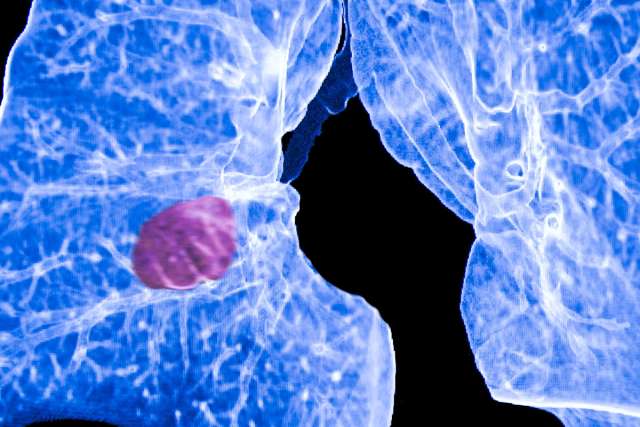Researchers from the UCLA Jonsson Comprehensive Cancer Center and the Dana-Farber Cancer Institute analyzed 515 patients with early stage non-small-cell lung cancer who were age 65 and older. They found that 27 percent or 140 patients of this group were at risk for major depressive disorder. Of these patients at risk for major depressive disorder, 34 percent received radiotherapy over surgery. Of the group of patients who were not at risk for depression, only 22 percent received radiotherapy over surgery.
BACKGROUND
The majority of people diagnosed with lung cancer each year have non-small-cell lung cancer and are on average 70 years old. The standard of care for patients with early stage non-small-cell lung cancer is surgery, where the tumor is removed. However, for patients who are not healthy enough to have this surgery due to age or physical frailty, radiotherapy is a treatment option that offers similar outcomes.
Traditionally, physicians have taken into account a patient’s physical health when considering treatment. However, since a patient’s quality of life is important to also consider, it is key to understand the treatment options older adults choose based on both their physical and their mental health.
METHOD
To better understand the mental health of patients with non-small-cell lung cancer and the treatment options they choose, the researchers obtained survey data from the SEER and Medicare Health Outcomes Survey. Based on a scoring system, the Health Outcomes Survey measures the risk for major depressive disorder as well as patient’s assessments of their physical and mental quality of life.
The researchers selected the surveys from people age 65 years and older who completed the surveys within two years of being diagnosed with this cancer type. The researchers analyzed the data and found that a higher proportion of people who were at risk for major depressive disorder chose radiation therapy over surgery. Of the 515 patients, 61 percent received surgery, 23 percent radiation therapy and 16 percent weren’t treated with either therapy. Out of the 23 percent who received radiation therapy a higher proportion were at risk for major depressive disorder.
IMPACT
For patients who are older and who are diagnosed with stage I non-small-cell lung cancer, there is a correlation between their risk for major depressive disorder before diagnosis and their selection of radiation therapy as their course of treatment. Additional research is needed to determine how these decisions are made in the clinic between physicians and patients.
AUTHORS
Ann Raldow with UCLA is the corresponding author. Other UCLA authors include the first author, Ritchell van Dams, as well as Tristan Gorgan and Percy Lee. Rinaa Punglia is with Dana-Farber Cancer Institute. The preliminary results of this study were shared at the American Society of Radiation Oncology 2019 annual conference in Chicago.
JOURNAL
The research was published by ASCO’s JCO Clinical Cancer Informatics.
DISCLOSURES
Percy Lee reports honoraria and advisory roles with AstraZeneca, Medimmune, Varian Medical Systems, and ViewRay.




